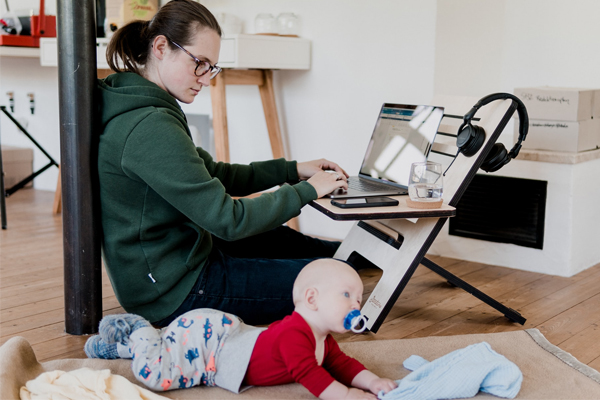More than half of working single mums in the UK face pension poverty, new research has revealed today on Single Parents Day.
Around 58% of single working mums are not eligible for automatic enrolment into a workplace pension; that’s up from 45% in 2020, according to research conducted by UK pension provider NOW: Pensions and the Pensions Policy Institute (PPI). There are currently under one million working single mothers in the UK; but current policies mean that more single mothers than ever are locked out of workplace pensions. The research shows that the average pension wealth for single mothers has dropped by 40%, since the start of the pandemic.
The number of single mothers missing out on a workplace pension is rising; meaning they are missing out on vital employer contributions. Currently, single mothers reach retirement with a private pension income of just £11,000. The PLSA’s retirement living standards suggests an income of £20,200 a year is needed for a ‘moderate lifestyle’; which means single mothers face significant pension poverty. With women living on average four years longer than men, women need to have saved more throughout their lifetime to accommodate a longer time in retirement.
COVID-19 AND CHILDCARE
Over the past two years, single mothers have had to juggle work and caring responsibilities; meaning that they are likely to have reduced their working hours or stopped working altogether. Research published by single parent charity Gingerbread highlights that single parents are almost twice as likely to be unemployed and underemployed; compared with couple parents and that long-term (a year or more) unemployment has increased for single parents since the pandemic.
The cost of childcare is a hindrance to many single-income households as the cost of childcare now tops the average cost of a mortgage. Policies aimed at alleviating childcare responsibilities, in terms of both time and stress, could help to improve labour market inequalities experienced by single mothers. These kinds of policies could reduce levels of part-time working; and help single mothers to overcome issues of vertical segregation and low pay in the workplace. The research found that the number of single mothers working part-time has increased to 54%; compared to the UK average of 21%. The high proportion of part-time workers means that they might not meet the eligibility criteria; as pension saving is only triggered once earning £10,000 in a single role.

‘INSURMOUNTABLE’ CHILDCARE BARRIERS
Being out of a workplace pension means missing out on opportunities such as employer contributions as well as tax relief from the government. With all the financial difficulties that the Covid-19 pandemic has caused for single mothers, being the sole earners and carers of a household, it is getting increasingly difficult for them to save for retirement.
“Single parents face near-insurmountable barriers to securing work that pays the bills and allows for a decent standard of living,” highlighted Victoria Benson, Chief Executive of Gingerbread, the charity that supports single parents. “This new research shows that for many single mothers chronic low income will persist well into retirement. Single parents are unable to ‘shift parent’ like couples can; meaning they require external childcare support for every hour of work they do.”
UNSUSTAINABLE HIGH CHILDCARE COSTS
High childcare costs mean many will only be able to work part-time and/or in insecure roles; two key determinants of low pay. “Low pay matched with the costs of raising children makes poverty and debt the norm, while savings and pension pots become a pipedream,” added Benson. “The pandemic has exacerbated this situation. Urgent support is needed to tackle the barriers single parents face securing quality, flexible and sustainable jobs that work around their caring commitments; without this, single parents are at risk of being locked out of work altogether. It’s not right that such a large section of our society will continue to experience hardship well into retirement simply because they are single parents. Single parents are amazing and more must be done to ensure they are not left behind.”
Samantha Gould, Head of Campaigns at NOW: Pension, described the findings as ‘troubling’. “It is really troubling that the majority of single mothers are being locked out of workplace pension savings; with single mothers reaching retirement age with the lowest pension wealth on record. The costs of childcare are unsustainable; and as a single mother myself, there is already so much pressure as both the sole earner and carer in a household. Single mothers will be feeling the pinch with many forced to stop working altogether to care for their children.”

PENSION GAPS FOR WOMEN
This “perpetuates the current pensions gaps experienced by some groups in the UK which need to be addressed”, she added. “With the majority of single mothers now locked out of workplace pensions, we are calling on the government to make policy changes; and remove the auto-enrolment trigger of £10,000 and starting contributions from the first £1 of earnings. This would bring an additional 200,000 single mothers into workplace pensions and increase women’s pension financial security in retirement. We must ensure that everyone has an equal opportunity to save for their futures; and build an adequate savings pot for later in life.”
Commenting on the findings, 26 year-old self-employed single mum Charlotte Carter, stated: “As a single parent and someone who is self-employed, I know first-hand the financial barriers that are faced by both these groups. As much as these new figures are dreadful, they don’t surprise me. As a single mother, it’s hard to plan for the future, as planning for the next month or year can often be a challenge.”
With the current living costs on the increase, “these barriers are only going to get worse, but we’re a resilient group and we will keep fighting for equality in society”, she added. I have never even considered my long-term finances as my focus has always been zoned in on what actions I can take to improve my immediate future. I am relocating out of the city in order to secure rental accommodation due to the housing crisis. Single parents’ finances are being squeezed. More needs to be done to support single parents save for their future and raising awareness of this issue; and the solutions that could resolve it is something that I believe can help make that change.”
Click here to access the full report.








































